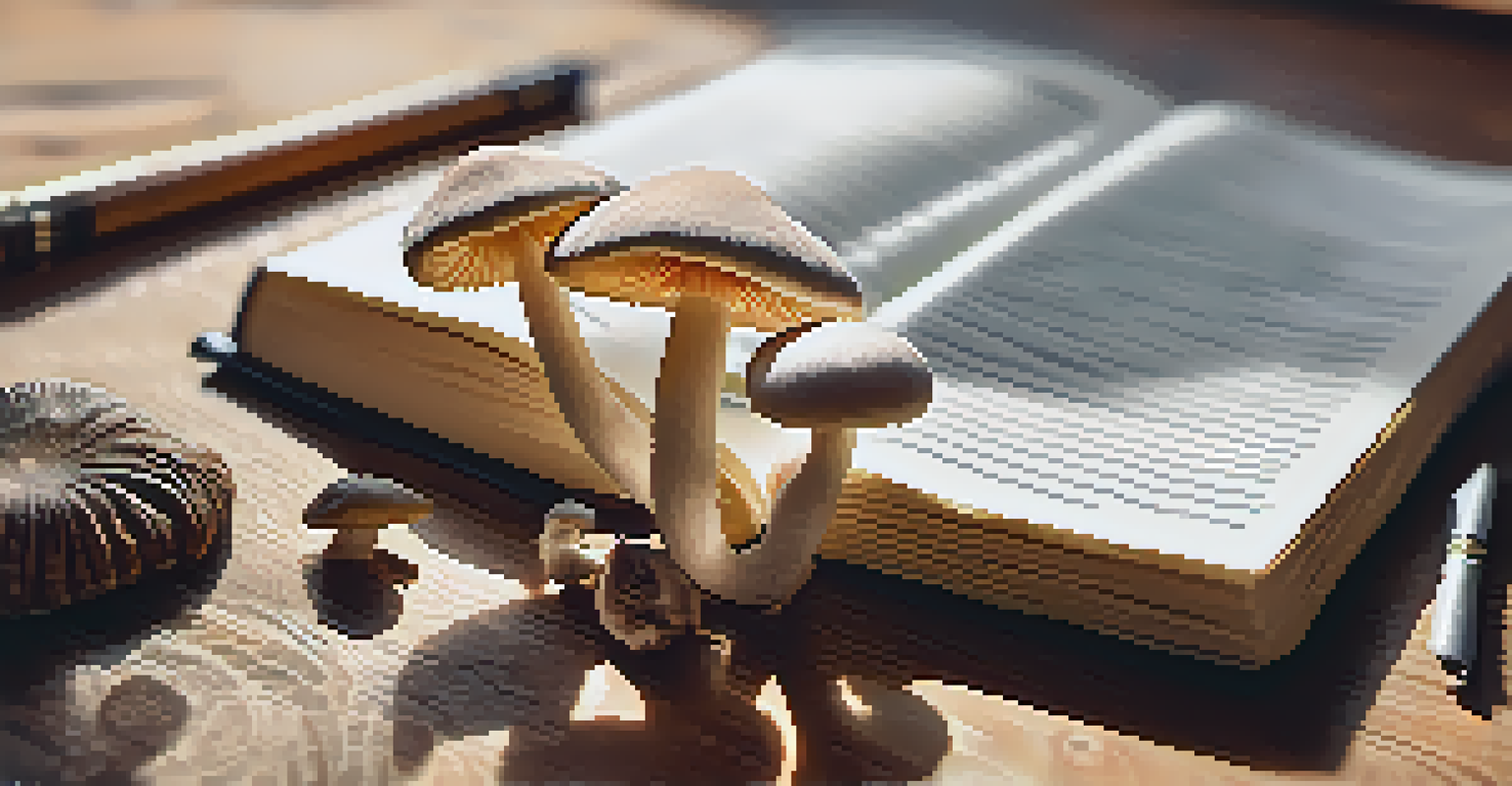Entheogens in Spiritual Practices: A Societal Perspective

Understanding Entheogens and Their Historical Context
Entheogens are substances that produce spiritual experiences, often found in natural plants or fungi. Historically, many cultures have used these substances in sacred rituals and ceremonies, viewing them as a bridge to the divine. For instance, indigenous tribes in the Amazon have utilized ayahuasca for centuries, seeking healing and insight from these powerful plants.
Psychedelics are a way of exploring the mind, and a way of exploring our relationship to the divine.
These practices are not just random; they are deeply rooted in tradition and serve various purposes, from healing to community bonding. In many cases, the use of entheogens is intertwined with the cultural identity of a group, providing a sense of belonging and purpose. This rich tapestry of history showcases how these substances have been revered rather than feared in numerous societies.
Despite the stigmatization of entheogens in modern society, their historical significance cannot be overlooked. Understanding their role in spiritual practices helps to frame current discussions around their potential benefits and risks. This perspective invites a reevaluation of how we view entheogens in the context of contemporary spirituality and mental health.
The Psychological Effects of Entheogens on Spirituality
Entheogens can induce profound psychological effects that many describe as spiritual awakenings. Users often report feelings of interconnectedness, deep insights, and a sense of transcendence. These experiences can challenge one’s perception of self and reality, leading to transformative personal growth.

For example, many have shared stories of how their use of psilocybin mushrooms helped them overcome anxiety or depression, allowing them to reconnect with their inner selves. This phenomenon has sparked interest in the therapeutic potential of these substances, particularly in treating mental health issues. The blend of spirituality and psychology opens up new avenues for healing and self-discovery.
Entheogens Promote Spiritual Growth
Entheogens can facilitate profound spiritual experiences, leading to personal growth and insights.
However, it's essential to approach these substances with caution. Not all experiences are positive; some may lead to challenging psychological states. Understanding the balance between the potential benefits and risks is crucial, especially when integrating entheogens into spiritual practices.
Cultural Perspectives on Entheogen Use in Spirituality
Different cultures have distinct approaches to entheogen use, often reflecting their unique spiritual beliefs. For instance, in some shamanic traditions, these substances are seen as tools for communication with spirits or the universe, while in Western contexts, they may be viewed through a psychological or recreational lens. This divergence highlights how cultural narratives shape our understanding of entheogens.
The use of entheogens is a journey inward that can lead to profound experiences of interconnectedness and healing.
In recent years, there’s been a resurgence of interest in these practices, particularly among those seeking alternative spiritual experiences. This revival often draws on ancient traditions, adapting them for modern contexts. However, it raises questions about cultural appropriation and respect for indigenous practices, emphasizing the need for sensitivity in these explorations.
As society evolves, so does the conversation surrounding entheogens. The blending of traditional and modern practices can create rich, diverse spiritual experiences, but it’s vital to honor the origins and significance of these substances within their cultural contexts.
Legal and Ethical Considerations in Entheogen Use
The legal status of entheogens varies widely around the world, influencing their availability and use in spiritual practices. In some countries, substances like ayahuasca and peyote are legally protected for religious use, while in others, they remain strictly prohibited. This legal landscape can create barriers for those seeking spiritual growth through these substances.
Ethically, the conversation becomes even more complex. The commercialization of entheogenic experiences raises concerns about exploitation and authenticity, particularly when traditional practices are commodified. It’s crucial to consider who benefits from these practices and whether they respect the cultural roots from which they stem.
Cultural Context Shapes Usage
The use of entheogens varies greatly across cultures, reflecting unique spiritual beliefs and practices.
Ultimately, navigating the legal and ethical dimensions of entheogen use requires a nuanced understanding. Engaging in open conversations about these issues can help foster a more responsible and respectful approach to integrating entheogens into spiritual practices.
Modern Science and the Study of Entheogens
Recent scientific research on entheogens has begun to unveil their potential benefits and risks, especially in the realm of mental health. Studies have shown promising results for substances like MDMA and psilocybin in treating conditions such as PTSD and depression. This scientific grounding lends legitimacy to the spiritual experiences many users describe.
Moreover, neuroscience has started to explore how entheogens affect the brain, providing insights into their mechanisms of action. Understanding the biological basis of these experiences can help bridge the gap between science and spirituality, offering a more comprehensive view of entheogens' role in healing.
However, while the science is fascinating, it’s essential to maintain a holistic perspective. Spiritual experiences are deeply personal and cannot be fully explained through biological mechanisms alone. Balancing scientific inquiry with respect for the subjective nature of these experiences is crucial in the ongoing exploration of entheogens.
Entheogens and the Quest for Meaning in Life
For many, the use of entheogens is intertwined with the quest for meaning and understanding in life. These substances can catalyze introspection and self-discovery, prompting individuals to confront existential questions. In this way, entheogens serve as powerful tools for exploring one’s purpose and place in the universe.
Personal anecdotes often reveal how these experiences can lead to deep insights about life, love, and connection. For instance, someone might emerge from an entheogenic journey with a renewed sense of compassion for themselves and others, fostering a desire to contribute positively to the world. This transformative potential speaks to the heart of what many seek in spiritual practices.
Legal and Ethical Challenges Ahead
The evolving legal status and commercialization of entheogens raise important ethical considerations for their use in spirituality.
However, the journey is not without challenges. The pursuit of meaning through entheogens requires careful navigation, as the insights gained can be both enlightening and overwhelming. It’s essential to approach these experiences with intention and support, ensuring they contribute positively to one’s spiritual journey.
The Future of Entheogens in Spiritual Practices
As awareness and acceptance of entheogens grow, their role in spiritual practices is likely to evolve. We may see a shift towards more inclusive and respectful integration of these substances into mainstream spirituality. This evolution could foster deeper connections among individuals seeking healing, community, and understanding.
Moreover, the potential for entheogens to enhance spiritual practices is vast. They could serve as catalysts for deeper meditation, more profound rituals, or even new forms of artistic expression. The melding of ancient wisdom with modern insights may lead to innovative practices that resonate with a broader audience.

However, with this potential comes the responsibility to approach entheogens thoughtfully. As we move forward, maintaining a dialogue about their use, effects, and ethical implications will be vital. This conversation will shape the future landscape of spirituality and the role that entheogens play within it.